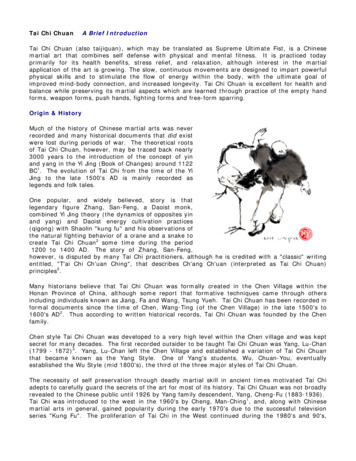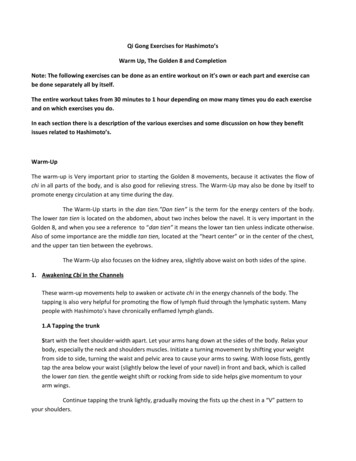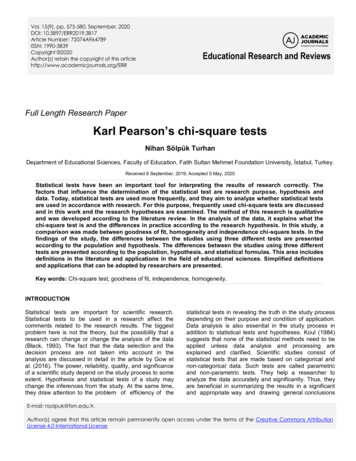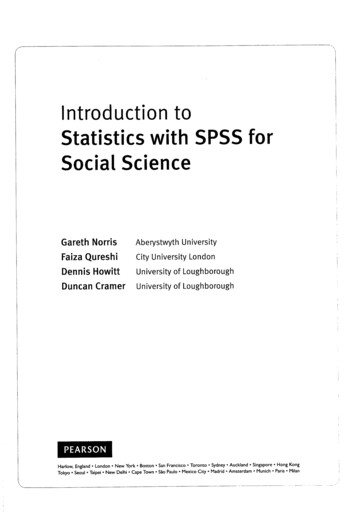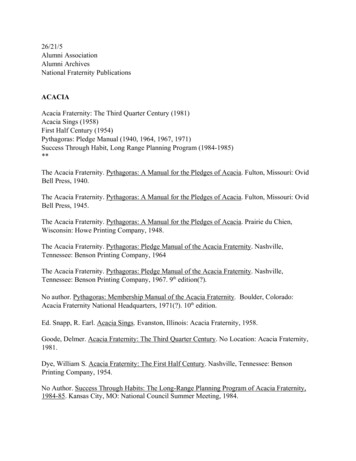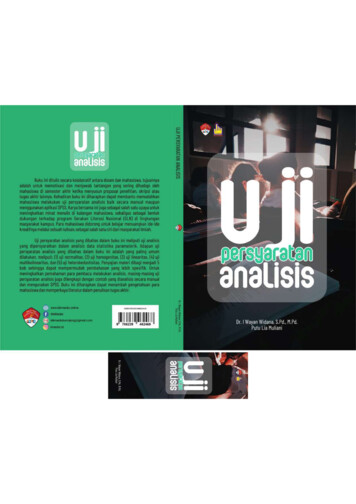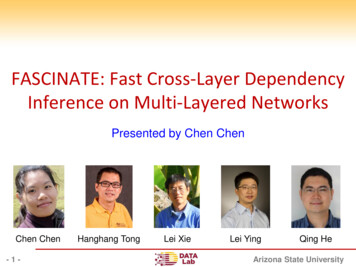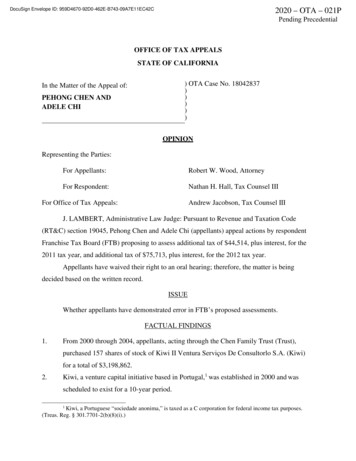
Transcription
DocuSign Envelope ID: 959D4670-92D0-462E-B743-09A7E11EC42C2020 – OTA – 021PPending PrecedentialOFFICE OF TAX APPEALSSTATE OF CALIFORNIA) OTA Case No. 18042837)))))In the Matter of the Appeal of:PEHONG CHEN ANDADELE CHIOPINIONRepresenting the Parties:For Appellants:Robert W. Wood, AttorneyFor Respondent:Nathan H. Hall, Tax Counsel IIIFor Office of Tax Appeals:Andrew Jacobson, Tax Counsel IIIJ. LAMBERT, Administrative Law Judge: Pursuant to Revenue and Taxation Code(RT&C) section 19045, Pehong Chen and Adele Chi (appellants) appeal actions by respondentFranchise Tax Board (FTB) proposing to assess additional tax of 44,514, plus interest, for the2011 tax year, and additional tax of 75,713, plus interest, for the 2012 tax year.Appellants have waived their right to an oral hearing; therefore, the matter is beingdecided based on the written record.ISSUEWhether appellants have demonstrated error in FTB’s proposed assessments.FACTUAL FINDINGS1.From 2000 through 2004, appellants, acting through the Chen Family Trust (Trust),purchased 157 shares of stock of Kiwi II Ventura Serviços De Consultorlo S.A. (Kiwi)for a total of 3,198,862.2.Kiwi, a venture capital initiative based in Portugal,1 was established in 2000 and wasscheduled to exist for a 10-year period.1Kiwi, a Portuguese “sociedade anonima,” is taxed as a C corporation for federal income tax purposes.(Treas. Reg. § 301.7701-2(b)(8)(i).)
DocuSign Envelope ID: 959D4670-92D0-462E-B743-09A7E11EC42C2020 – OTA – 021PPending Precedential3.According to Annual Information Statements issued by Kiwi to the Trust, Kiwi madetotal payments to appellants of 637,389, as follows: (1) 2007: 230,882; (2) 2009: 203,309; (3) 2010: 122,338; and (4) 2011: 80,860.2 The statements indicate thatKiwi had no current or accumulated earnings and profits for the 2011 tax year.4.Appellants timely filed a joint 2007 California resident income tax return that did notreport any dividend income on the distributions from the Kiwi stock. OnDecember 30, 2008, appellants filed an amended 2007 return, which also reported nodividend income from Kiwi. On September 14, 2011, appellants filed a second amended2007 return, which, again, did not show any dividend income from Kiwi. The secondamended return stated that any income or loss from Kiwi was recognized under the markto-market (MTM) election for federal tax purposes, and since Kiwi was a passive foreigninvestment company (PFIC), any income and loss generated by Kiwi was not subject toCalifornia tax.3 FTB accepted appellants’ 2007 second amended return as filed.5.Appellants filed a joint 2009 California resident income tax return, which reported along-term capital gain of 221,531 from a distribution with respect to the Kiwi stock.However, appellants filed a 2009 amended tax return, which removed the capital gain.The return stated that any income or loss from Kiwi was recognized under the MTMelection for federal tax purposes, and since Kiwi was a PFIC, any income or lossgenerated by Kiwi was not subject to California tax. FTB accepted appellants’ 2009amended return as filed.6.Appellants timely filed a joint 2010 California resident income tax return that did notreport any dividend income on the distributions of 122,338 from the Kiwi stock.7.Kiwi closed its business operations in 2011 and its liquidation was complete onDecember 29, 2011. Appellants timely filed a joint 2011 California resident income taxreturn that did not report any dividend income on the distributions of 80,860 from theKiwi stock. On the return, appellants reported a sale of 157 shares of Kiwi stock with acost basis of 3,198,862 and a loss in the same amount, due to the closing of Kiwi’sbusiness operations. On February 15, 2013, appellants filed an amended 2011 return,which did not make any adjustment with respect to the Kiwi stock. Appellants claimed2Kiwi closed business operations in 2011.3California does not conform to the federal PFIC rules. (R&TC, § 24995.)Appeal of Chen and Chi2
DocuSign Envelope ID: 959D4670-92D0-462E-B743-09A7E11EC42C2020 – OTA – 021PPending Precedential 3,000 of the capital losses in 2011, resulting in a capital loss carryover to their 2012taxable year in the amount of 569,267.48.FTB audited appellants’ 2011 return and determined that the distributions in 2007, 2009,2010, and 2011 were non-dividend distributions that reduced their stock basis.Accordingly, FTB reduced the stock basis of 3,198,862 by the total reporteddistributions of 637,389, which reduced the reported loss of 3,198,862 by that amount.On March 31, 2017, FTB issued Notices of Proposed Assessment (NPAs) for 2011 and2012. The 2011 NPA disallowed appellants’ claimed capital loss of 3,000 and increasedtheir capital gain by 553,426, increasing their taxable income in the aggregate by 556,426.5 The NPA proposed to assess additional tax of 44,514, plus interest.9.The 2012 NPA disallowed a capital loss carryover of 569,267, increasing appellants’taxable income by the same amount. The NPA proposed to assess additional tax of 75,713, plus interest.10.Appellants protested the NPAs. On January 12, 2018, FTB issued Notices of Action for2011 and 2012, which affirmed its NPAs for both years. This timely appeal followed.DISCUSSIONFTB’s determination is presumed correct, and a taxpayer has the burden of proving error.(Todd v. McColgan (1949) 89 Cal.App.2d 509; Appeal of Myers (2001-SBE-001) 2001 WL37126924.) Unsupported assertions are not sufficient to satisfy a taxpayer’s burden of proof.(Appeal of Magidow (82-SBE-274) 1982 WL 11930.) In the absence of credible, competent, andrelevant evidence showing that FTB’s determination is incorrect, it must be upheld. (Appeal ofSeltzer (80-SBE-154) 1980 WL 5068.)Internal Revenue Code (IRC) section 1001 provides that the gain on the sale of propertyshall be the excess of the amount realized over the adjusted basis of the property.6 IRCsection 1011 provides that the adjusted basis for determining the gain from the sale of property4Appellants also reported capital gains and losses on their return unrelated to Kiwi, which resulted in a netcapital loss carryover of - 569,267.5The discrepancy between the contested adjustment of 637,389 and the NPA amount of 556,426 is aresult of another adjustment determined during audit, which was not contested by appellants, along with the nettingof appellants’ capital gains and losses.6California conforms to IRC sections 1001 and 1011 through 1016 atAppeal of Chen and Chi3
DocuSign Envelope ID: 959D4670-92D0-462E-B743-09A7E11EC42C2020 – OTA – 021PPending Precedentialshall be the property’s initial basis (determined under IRC section 1012 or other applicablestatutes in that subchapter) adjusted as provided for in IRC section 1016. IRC section 1012provides that the basis of property generally shall be the cost of such property.IRC section 316, incorporated by R&TC section 17321, provides that a dividend meansany distribution of property made by a corporation to its shareholders out of its earnings andprofits accumulated after February 28, 1913, or out of its earnings and profits of the taxable year.IRC section 301(c)(1) states that the portion of the distribution which is a dividend shall beincluded in gross income. Dividends will be considered to have been paid in the followingorder: (1) from the earnings and profits of the taxable year; (2) from the earnings and profitsaccumulated since February 28, 1913; and (3) from sources other than earnings and profits onlyafter the earnings and profits have been distributed. (IRC, § 316(a) [flush language]; Treas. Reg.§ 1.316-2(a).)If the earnings and profits of the taxable year (computed as of the close of the yearwithout diminution by reason of any distributions made during the year and without regard to theamount of earnings and profits at the time of the distribution) are sufficient in amount to coverall the distributions made during that year, then each distribution is a taxable dividend. (Treas.Reg. § 1.316-2(b).) In general, a distribution of property made by a corporation to a shareholderwith respect to its stock that is not a dividend shall be applied against and reduce the adjustedbasis of the stock. (IRC, § 301(c)(2).) The portion of a distribution which is not a dividend, tothe extent that it exceeds the adjusted basis of the stock, shall be treated as gain from the sale orexchange of property. (IRC, § 301(c)(3).)Appellants received distributions of 230,882 for 2007, 203,309 for 2009, 122,338 for2010, and 80,860 for 2011, totaling 637,389. Contrary to what was reported to FTB on theirtax returns (both original and amended), appellants now argue that the distributions weredividends that did not reduce their stock basis in Kiwi. On the other hand, FTB argues thatappellants are barred by the duty of consistency and, as a result, the distributions must be treatedas originally reported -- as non-dividend distributions that reduced their stock basis.The duty of consistency, like the doctrine of judicial estoppel, ‘“precludes a party fromgaining an advantage by taking one position, and then seeking a second advantage by taking anincompatible position.’” (Estate of Ashman v. Commissioner (9th Cir. 2000) 231 F.3d 541, 543(Ashman), quoting Rissetto v. Plumbers & Steamfitters Local 343 (9th Cir. 1996) 94 F.3d 597,Appeal of Chen and Chi4
DocuSign Envelope ID: 959D4670-92D0-462E-B743-09A7E11EC42C2020 – OTA – 021PPending Precedential600.) The duty of consistency requires a showing of three elements: (1) a representation orreport by the taxpayer; (2) on which FTB has relied; and (3) an attempt by the taxpayer after thestatute of limitations has run to change the previous representation or to recharacterize thesituation in such a way as to harm FTB. (Ashman, supra, 231 F.3d at p. 546, quotingHerrington v. Commissioner (5th Cir. 1988) 854 F.2d 755, 758.)Here, in our view, on their original and amended tax returns for the 2007 through 2010tax years, appellants essentially represented that the distributions were non-dividend distributionsbecause they did not pay tax on them. Appellants now attempt to recharacterize the distributionsas taxable dividends after the statute of limitations has run to assess them additional taxes.R&TC section 19057(a) generally provides that FTB shall mail a notice of a proposeddeficiency assessment to the taxpayer within four years after the return was filed. Therefore, thestatute of limitations has long expired for the 2007, 2009, and 2010 tax years and FTB cannotpropose an assessment of additional taxes on the alleged dividend income.Appellants argue that the reporting of a distribution as a dividend does not change itsunderlying nature, citing Halpern v. Commissioner, T.C. Memo. 1982-31 (Halpern). However,Halpern does not apply to this appeal, as we are not addressing whether the amounts weredividends or non-dividend distributions, but rather whether appellants must continue to treat theamounts as non-taxable distributions under the duty of consistency. Appellants also argue thatthe duty of consistency only applies to issues of fact, not law, citing UNUM Corp. v. UnitedStates (D.Me. 1995) 886 F.Supp. 150 (UNUM). In UNUM, the Internal Revenue Service (IRS)was aware of the facts at all times, as it conducted an in-depth audit within the limitations period.In the present appeal, appellants represented that the amounts were non-taxable distributions andFTB did not conduct an audit of the 2007, 2009, and 2010 tax years. Furthermore, the court inUNUM found that the IRS was not injured by the taxpayer’s recharacterization because thetaxation was passed to another party. This is not the case in the present appeal because, ifappellants were not bound by the duty of consistency, the alleged dividends would escapetaxation without reducing the basis of the Kiwi stock. Therefore, appellants are barred by theduty of consistency from recharacterizing the payments received in 2007, 2009, and 2010 asdividends.Unlike the 2007, 2009, and 2010 tax years, appellants’ 2011 tax year is still subject toadjustment because it is not barred by the statute of limitations. However, appellants concedeAppeal of Chen and Chi5
DocuSign Envelope ID: 959D4670-92D0-462E-B743-09A7E11EC42C2020 – OTA – 021PPending Precedentialthat, for the 2011 tax year, Kiwi had no current or accumulated earnings and profits from whichto pay a dividend, which is corroborated by Kiwi’s 2011 Annual Information Statement.Therefore, we conclude the 2011 payment of 80,860 must be treated as a non-dividenddistribution that reduces appellants’ stock basis in Kiwi. As such, the payments at issue totaling 637,389 were properly treated as a return of capital that lowered appellants’ basis in their Kiwistock.HOLDINGAppellants have failed to demonstrate error in FTB’s proposed assessments.DISPOSITIONFTB’s action is sustained.Josh LambertAdministrative Law JudgeWe concur:Richard I. TayAdministrative Law JudgePatrick J. KusiakAdministrative Law JudgeDate Issued: 1/14/2020Appeal of Chen and Chi6
Kiwi stock. On the return, appellants reported a sale of 157 shares of Kiwi stock with a cost basis of 3,198,862 and a loss in the same amount, due to the closing of Kiwi's business operations. . Plumbers & Steamfitters Local 343 (9th Cir. 1996) 94 F.3d 597, DocuSign Envelope ID: 959D4670-92D0-462E-B743-09A7E11EC42C Appeal of Chen and Chi .
